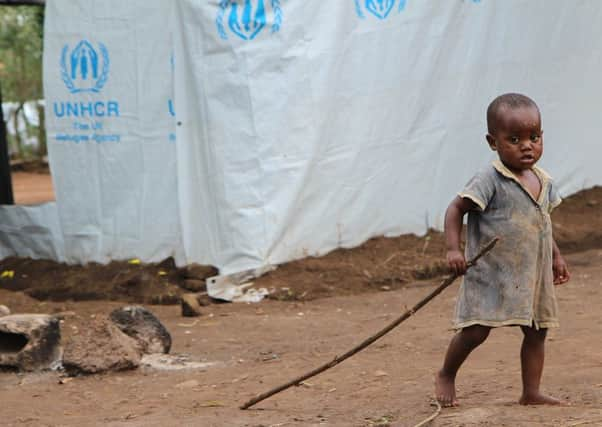Alistair Dutton: Scots supporting Burundian refugees in Rwanda


The political crisis in Burundi has killed 450 people so far, with over a quarter of a million fleeing into neighbouring countries in fear of their lives. Supported by people in Scotland, SCIAF and its Caritas partners are in Rwanda, are helping many of the most vulnerable Burundian refugees.
The crisis started in April last year when the Burundian Electoral Commission ruled that it was constitutional for the president, Pierre Nkurunziza, to stand for office for a third term. The president was nominated by MPs in his first term as part of the peace agreement and claims that the limit of two terms in the constitution relates only to elected terms. This provoked widespread protests, especially in the country’s capital Bujumbura, which were violently suppressed. This, in turn, led to an attempted coup, followed by a brutal crackdown by the army and police against protesters and anyone opposing the government. In late July President Nkurunziza was re-elected, the legitimacy of which was hotly contested.
Advertisement
Hide AdAdvertisement
Hide AdFear has become the hallmark of the crisis. Many people are frightened that they will be caught up in the conflict and a youth militia which supports the government have attacked and intimidated civilians. A major operation is now under way to help over 263,000 refugees who have fled into Rwanda, Tanzania, DR Congo and Uganda. Some refugees have been able to move to towns and cities like Rwanda’s capital, Kigali, but as the crisis continues their few savings dwindle, leaving them hungry, homeless and in need of help. Many of those who have fled from Burundi are arriving in newly created refugee camps, malnourished and in a very poor state of health.
Over 76,000 Burundians have crossed the border into Rwanda, with 45,000 living in the Mahama refugee camp in eastern Rwanda. Many charities are working with the United Nations to provide food, water, shelter, and healthcare. There are many children in the Mahama camps, with an estimated 47 per cent of the population under 17 years and 15 per cent under five. Protecting vulnerable children, creating safe classrooms in the camps and helping older children to enrol in schools are essential to reduce the terrible impact the crisis will have on them in the long term.
SCIAF is working closely with Caritas Rwanda in the Mahama camp and has given £85,000 to buy nutritious food for particularly vulnerable refugees including unaccompanied children, pregnant women, disabled people, the elderly and those living with HIV and AIDS. We’ve helped nearly 4,500 people to get milk, flour, sugar, fruit and vegetables, in addition to the camp’s basic rations given by the World Food Programme.
The large-scale movement of people in crises such as this can also lead to a sharp increase in rape and sexual violence as families and communities, which usually act as protection for women and girls, are broken up. Within the refugee camps a lack of space and other limitations mean that people are unable to support themselves by growing crops or keeping livestock.
With such a large influx of new arrivals into neighbouring countries, huge pressure is being placed on the host communities. The struggle to get food for many local families who are already extremely poor can often lead to a build-up of resentment and spill over into violence. It’ll be important in the months ahead to help vulnerable families living alongside the refugees and build positive relations between the two communities.
Of course, the only solution to the political crisis in Burundi is peace. However, the outlook remains extremely bleak. The punitive attacks on people have been accompanied by a sharp rise in inflammatory speeches, many echoing the language of ethnic hate that was prominent in the region in the 1990s when over a million people were killed in the genocide. This is not an ethnic Hutu-Tutsi conflict at the moment but many fear that if the current crisis is not resolved, the country could spiral out of control.
The United Nations’ Security Council has strongly condemned the violence and called for the government to respect and protect everyone’s human rights but words are not translated into action and the violence continues unabated. The international community cannot afford to stand on the side-lines, wringing its hands as the situation deteriorates. In Scotland, it’s vital that we continue to support Burundian refugees, urge the UK government to do all it can to resolve the crisis, and pray for a peaceful long term solution.
• Alistair Dutton is the director of the Scottish Catholic International Aid Fund